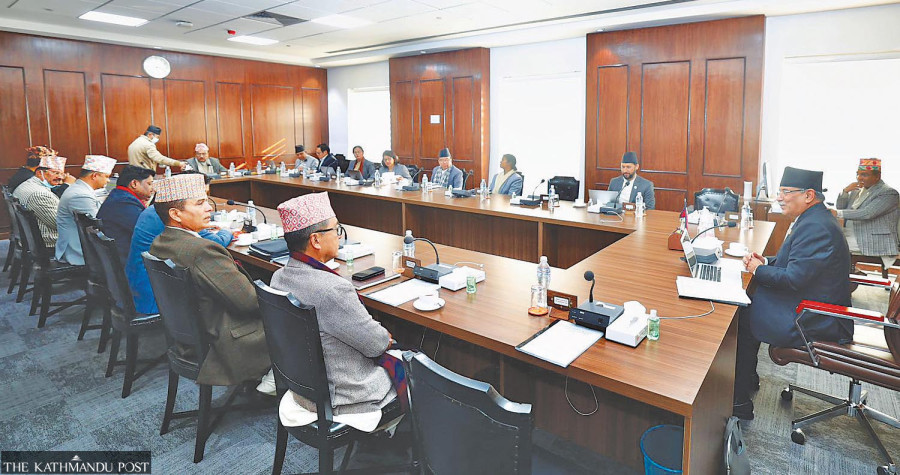Columns
Losing faith in the system
The state of politics and bureaucracy in Nepal demands urgent attention and reform.
Tulasi Acharya
The state of politics in Nepal has been a matter of concern as issues of accountability, transparency and efficiency in the government have remained unchanged for decades. This is not limited to politicians and extends to bureaucrats and government offices as well. A recent incident during my visit to the District Administration Office in Lalitpur to obtain a passport for my one-year-old daughter is a glaring example. The authorities insisted on seeing my daughter in person despite providing proof of her identity. I tried to explain that my daughter was still breastfeeding, and it would be healthier for her to stay home instead of coming here, enduring traffic, hot weather, congestion and smoke. However, they insisted that I bring her. Reluctantly, I brought my daughter to their office, but surprisingly they didn't seem to be interested, leaving me wondering why they had asked me to bring her at all.
When I went to renew my citizenship the following day, I had to wait in line for half an hour because the official in charge was in the restroom. While I understood that nature's call can be unpredictable, I voiced my concerns but received no empathy. The official gave me a hard time, claiming I didn't have the necessary paperwork, but eventually, the same documents he had previously reviewed were found to be adequate.
Many Nepalis face similar issues daily, and their faith in the system is thinning, underscoring the urgent need for reform in our country's bureaucracy and political landscape regarding accountability, responsibility and work efficiency.
Effective governance
A healthy and cooperative relationship between politicians and bureaucrats is crucial for effective governance. The failure of this cooperation leads to inefficiency, delays and a lack of progress. The disconnect between politicians and bureaucrats is symptomatic of the lack of leadership and accountability besides increased nepotism and corruption within the system. The first step towards improvement is for politicians and administrators to understand the ground reality before embarking on their projects. Moreover, when individuals seek government jobs or political office, they should question their intentions: Is it for personal gain and job security or to create positive changes in society? Understanding the motivation behind their actions is essential to determine the outcome of their future endeavours.
In Nepal, many projects are carried out without a comprehensive understanding of the local context, including the geographical features, residents’ requirements and the environment. Policies are formulated and put into action without thorough consideration of their effects on people's lives. History provides valuable lessons about the consequences of failing to understand the implications of one's actions. The construction of the Panama Canal is a poignant example. In their book Power and Progress: Our Thousand-Year Struggle Over Technology and Prosperity, Daron Acemoglu and Simon Johnson talk about how the initial success of the Suez Canal led to the mistaken belief that the same principles would apply to the Panama Canal. The result was a project marred by devastation and loss of lives. This story illustrates the importance of considering the unique circumstances and challenges of projects rather than relying solely on past knowledge.
Local knowledge
It is essential to involve the people directly affected by the effects of policies in policymaking. Listening to local stories, experiences and concerns is paramount. Unfortunately, in Nepal, this often goes overlooked. Policymakers tend to rely on their own biased knowledge, leading to policies that may not address the needs and concerns of the local population. Contrastingly, countries like the United States have learned from their history and understand the value of engaging with their citizens. This approach has been instrumental in its becoming a developed nation and a global power. Nepal should consider adopting a similar model to foster progress. Effective policies should be made so that the bureaucracy will be efficient.
The credibility of politicians and bureaucrats is closely linked to their ability to connect with the people they serve. When politicians actively engage with the public, listen to their stories, and integrate their perspectives into policymaking, they earn trust and credibility. This trust is established through accountability, strong performance, and a track record of fulfilling promises. Similarly, government officials contribute to the credibility of both themselves and the politicians when effectively delivering services to the public. They should maintain impartiality, remain dedicated and display charisma. Striking a balance between politics and administration is essential, and politicians must exhibit responsible behaviour. Failure to do so can erode their credibility.
A recent example of this credibility challenge involves the current president of Nepal, Ram Chandra Paudel. People seem to have lost trust in him due to a controversial decision to grant pardons on Republic Day to individuals like Resham Chaudhari and Yograj Dhakal who were involved in the murder of innocent individuals. The victims' families are protesting and staging hunger strikes in response to this misuse of presidential power. The decision faced a significant backlash as it was seen as a violation of justice, and it undermined the president's credibility. This case underscores the importance of comprehending public sentiment and making decisions accordingly.
The state of politics and bureaucracy in Nepal demands urgent attention and reform. A lack of accountability and transparency hinders progress and perpetuates inefficiency. To bring about positive change, politicians and bureaucrats must consider the ground realities, learn from history, embrace local knowledge, and engage with the people they serve. Accountability and credibility in politics are non-negotiable. To gain the trust of the people, politicians must actively listen to their stories and experiences, and their policies must reflect the needs of the nation. Only when this change occurs will Nepal move towards a brighter and more prosperous future.




 20.53°C Kathmandu
20.53°C Kathmandu















